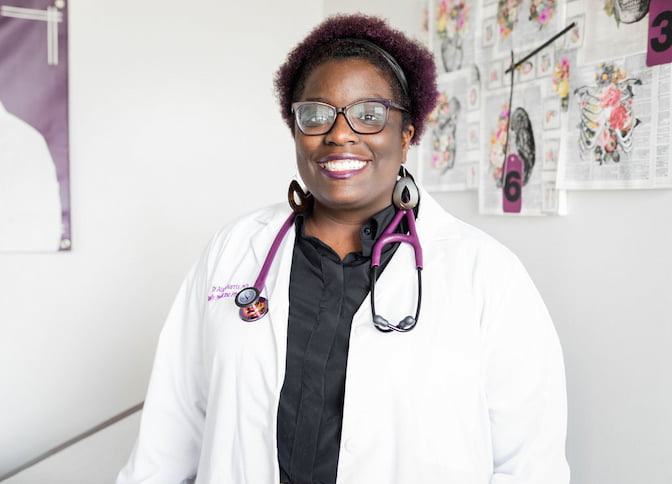
Building health, building community
Boosting her hometown with an engineer’s eye.

Boosting her hometown with an engineer’s eye.
Aisha Harris (BSE ChE ’11) developed a passion for the field of medicine while studying chemical engineering. She found herself gravitating toward work in fields like pharmaceuticals and health technology, but still saw herself, first and foremost, as an engineer.
That changed when she volunteered at a transition home for patients with HIV/AIDS. Working directly with patients, she said, made her realize that she “didn’t want to be in the background building machines for hospitals or creating medicines for people to dispense.” Instead, she decided to pursue a career that would enable her to improve people’s lives one patient at a time.
A little more than a decade later, Harris—now with an M.D. after her name—is the owner and primary physician of Harris Family Health, a direct primary care clinic, located in her hometown of Flint, Mich.
Like other direct primary care clinics, Harris Family Health’s business model differs from traditional primary care providers. Patients who don’t have traditional medical insurance can instead pay a fixed monthly fee directly to the clinic to cover visits. Harris also serves as a wholesaler for prescription medications, which can make them more affordable for patients than getting them from a regular pharmacy.
She says that patients come to her clinic for a variety of reasons. For some low-income patients, her practice is more affordable than an insurance plan. But she said that many of her patients do have insurance, and they choose to go to the clinic simply because it offers more transparency than large health care institutions. In addition, she said that patients appreciate the fact that they can have longer visits with their doctor, and that they can easily stay in touch with their care team.
Harris also works to promote health literacy, teaching patients how to navigate the deluge of online health information and how healthcare is administered by doctors, nurses and insurance companies. She teaches part-time at Michigan State University’s medical school and writes a public-health column for The Flint Courier News.
She says that, even though she isn’t a practicing engineer, her undergraduate degree at U-M Engineering continues to impact the way she practices medicine. Her engineering background, she explains, has taught her to base diagnoses and care decisions more on individual patients and less on statistical probabilities and “most likely” scenarios.
“I am treating people based on the most up to date information and not ‘feelings’ or stereotypes which can influence bias,” she said.
The common denominator of all of her work is the city where she grew up. “The general umbrella of what I do is being an advocate and resource for the Flint community,” she said. “I feel like I play a small role in developing and strengthening the community by being a really good primary care doctor to my patients, but also a good community resource.”